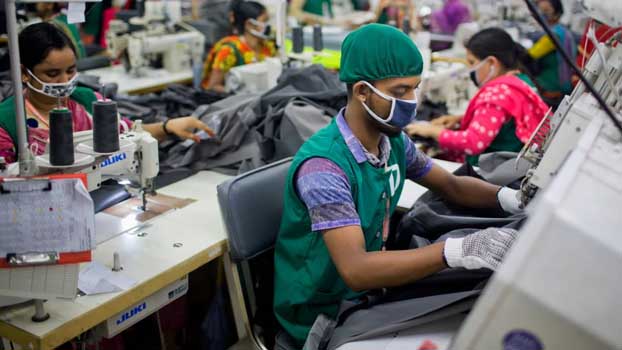Food security big challenge for RMG workers: Experts

Expressing concern about food security related challenges faced by the RMG workers due to the pandemic, speakers at a webinar on suggested to formulate policies to mitigate these long-term impacts as soon as possible.
They said the workers are adjusting by cutting their costs on human capital development such as, education, health, recreation etc., which would impose a huge inter-generational impact on the wellbeing of the country.
South Asian Network on Economic Modeling (SANEM) and Microfinance Opportunities (MFO) organized the webinar titled, “What’s going on? Lessons from the Garment Worker Diaries: COVID Context” On Saturday.
Tuomo Poutiainen, Country Director, ILO Bangladesh was the Special Guest of the webinar, moderated by Dr Bazlul Hoque Khondker, Professor, Department of Economics, University of Dhaka and Chairman of SANEM. Around sixty researchers, academicians, development practitioners, journalists, and students from home and abroad attended the webinar.
The webinar hosted an expert panel of discussants consisting of Dr Rubana Huq, President of Bangladesh Garment Manufacturers and Exporters Association (BGMEA); Ms Kalpona Akter, Executive Director, Bangladesh Centre for Workers' Solidarity; Ms Snigdha Ali, Bangladesh Program Officer, Financial Services for the Poor, Bill and Melinda Gates Foundation; and Mizanur Rashid, Chief Commercial Officer of bkash Limited. Dr Guy Stuart, Executive Director of Microfinance Opportunities, USA presented the research findings on the theme of the webinar which referred to an ongoing SANEM-MFO study. Dr Selim Raihan, Professor, Department of Economics, University of Dhaka and Executive Director of SANEM delivered the special remarks in the webinar. In his introductory remarks, Dr Khondker stressed the relevance of the issue in the context of the COVID-19 pandemic. He further shed light on the recent trends in labour market and subsequent macroeconomic impacts. Following the introductory remarks of the moderator, Dr Guy Stuart delivered the keynote presentation. He briefly discussed the sample size and data quality of the research. For two years, weekly interviews with 1,300 garment workers— a nationally representative sample- were conducted.
In his presentation, Dr Stuart further shed light on the wage digitalization in the RMG sector. In April 2020, about 1 in 4 workers were paid digitally. But in May 2020, 3 in 4 workers were paid digitally--nearly an increase in 2 million workers.
Dr Stuart further discussed that due to the pandemic there are reasons to be concerned about employment and food security in the garment sector. Between May and September workers went back to work and employment levels remained high.
Dr Rubana Huq addressed these issues. From her point of view, the rise in exports, which eventually raised the working hour, that was observed in June-July is solely due to the shipment of the un-exported orders of previous months.
However, she agreed upon the uncertainty regarding the future in the context of the second wave of pandemic. In other words, it is the situation in the future that will determine the employment situation in the Garment sector.
Mizanur Rashid, Chief Commercial Officer of bkash, explained that wage digitalization can reduce costs for a firm around half a dollar per worker. To facilitate the wage disbursement process, bkash also provided subsidy on disbursement charge and cash-out charge. However, it is Mr Rashid reiterated that this was not a sustainable solution for the long term.
Dr Selim Raihan provided his insightful remarks based on the discussion and presentation. He stressed that global recovery is crucial for the RMG sector. Moreover, he suggested that mobile financial services can invent new financial products specifically for the RMG sector workers.
He also shared his concern about food security related challenges faced by the RMG workers due to the pandemic. Hence, the workers are adjusting by cutting their costs on human capital development such as, education, health, recreation etc., which would impose a huge inter-generational impact on the wellbeing of the country. Hence, we need to formulate policies to mitigate these long-term impacts as soon as possible.


